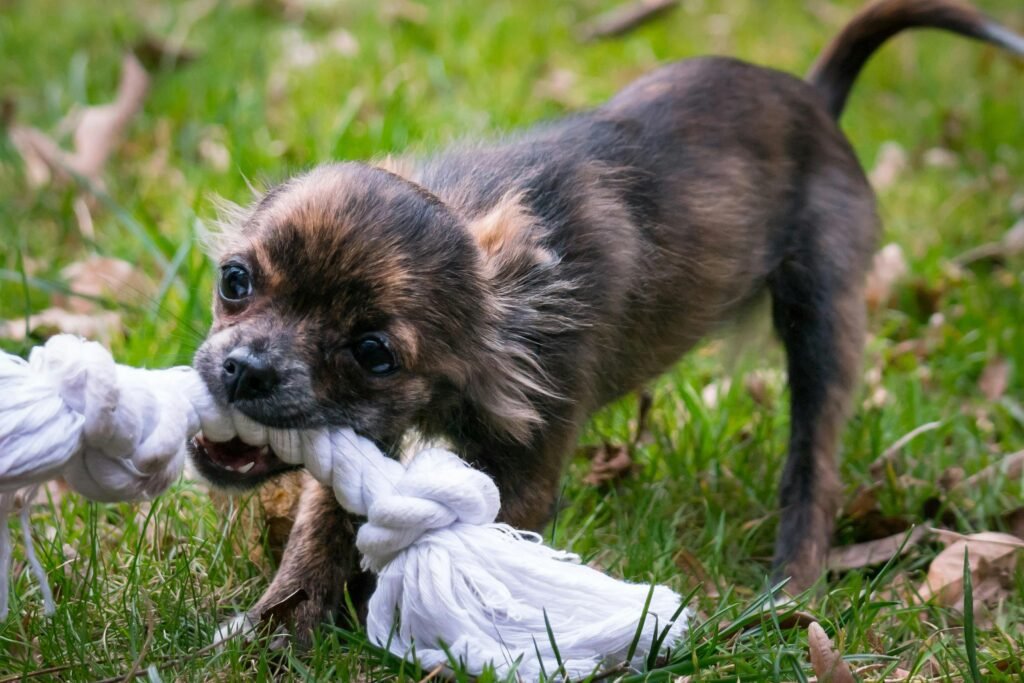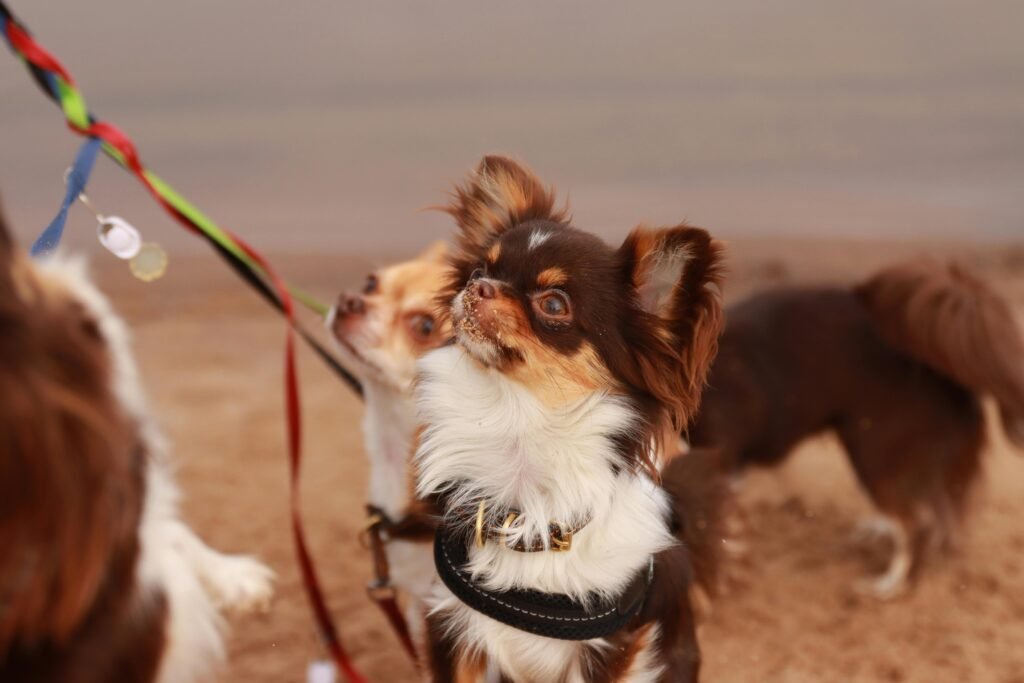Why Are Chihuahuas So Annoying? Understanding the Behavioral Traits That Make Chihuahuas Challenging
Let’s talk about Chihuahuas. These tiny dogs have a big reputation, often described as “annoying” by many.
But is there more to these little canines than meets the eye? Let’s dive into why Chihuahuas have earned this reputation and what makes them tick.
History and Origin of Chihuahuas
Chihuahuas have an ancient lineage tracing back to the Toltec civilization in Mexico, where they were known as Techichi dogs.
These small dogs were believed to have mystical and healing powers. The Aztecs later adopted and refined the breed. Chihuahuas remained relatively unknown until the late 19th century when they were brought to the United States.
Their small size and distinctive appearance quickly made them popular pets. Today, Chihuahuas are cherished worldwide for their unique charm and spirited personalities.

Why Are Chihuahuas So Annoying?
Chihuahuas are often considered annoying due to their high energy levels, frequent barking, and strong territorial instincts. Their small size makes them feel vulnerable, leading to defensive and protective behaviors.
They can be stubborn and challenging to train, and their tendency to suffer from separation anxiety results in clinginess and noise.
Additionally, their vocal nature and need for constant attention contribute to the perception of them being annoying. However, understanding these traits can help manage and appreciate their unique personalities.
Physical Characteristics
Chihuahuas are the smallest dog breed, typically weighing between 2 to 6 pounds and standing 6 to 9 inches tall. They have a distinct apple-shaped head, large round eyes, and prominent, erect ears.
Their coat can be either short and smooth or long and silky, and they come in a wide variety of colors and patterns. Despite their tiny size, Chihuahuas are known for their vibrant energy and agility.
Their small stature makes them highly portable and well-suited for apartment living, but also prone to feeling anxious or vulnerable.
Temperament and Personality
Chihuahuas have a temperament that is as bold as it is endearing. Despite their small size, they exhibit a fearless and sometimes overconfident demeanor. These dogs are incredibly loyal and form strong bonds with their owners, often becoming very protective. This loyalty can manifest as clinginess or territorial behavior, especially around strangers.
Chihuahuas are known for their alertness and high energy levels, always ready to play or defend their space. They can be quite affectionate and enjoy being close to their human companions, making them excellent lap dogs. However, their spirited nature requires proper training and socialization to ensure they don’t become overly aggressive or anxious.
Behavioral Traits
Chihuahuas are known for a set of distinctive behavioral traits. They are highly vocal, often barking at the slightest disturbance, which can be both a warning and a call for attention.
Their protective nature makes them territorial, and they can be wary of strangers and other animals. Despite their small size, Chihuahuas are fearless and can exhibit aggressive behavior when they feel threatened.
They tend to be very affectionate with their owners, seeking constant attention and companionship. Chihuahuas also have high energy levels and enjoy engaging in play and physical activities.
However, their small size can make them prone to anxiety, especially when left alone for long periods. Proper training and socialization from an early age are crucial to managing these traits and ensuring a well-behaved pet.

Why Do Chihuahuas Bark So Much?
Chihuahuas are notorious for their frequent barking, which stems from several reasons. Primarily, barking is their way of communicating; they use it to express excitement, fear, or alert their owners to perceived threats.
Their small size makes them feel vulnerable, so they bark to assert themselves and defend their territory. Additionally, Chihuahuas are highly energetic and intelligent, often barking out of boredom or a desire for attention.
They are also very loyal and protective of their owners, barking at strangers or unfamiliar situations to guard their loved ones. Without proper training and socialization, this natural tendency can become excessive and problematic.
Territorial and Protective Nature
Chihuahuas have a strong territorial and protective nature, which often surprises people given their small size. They view their home and family as their domain and will fiercely defend it against perceived threats.
This protective instinct makes them excellent watchdogs, but it can also lead to excessive barking and aggressive behavior toward strangers or unfamiliar animals. Chihuahuas are deeply loyal to their owners and can become particularly attached to one person, heightening their protective behavior.
Their territorial instincts can also manifest in guarding their food, toys, or favorite resting spots. Proper socialization and training are essential to manage these tendencies and help Chihuahuas distinguish between real threats and harmless situations.
Socialization Challenges
Chihuahuas often face socialization challenges due to their small size and naturally cautious temperament. They can be wary and defensive around unfamiliar people and animals, leading to aggressive or fearful behavior.
This makes early and consistent socialization crucial for helping them develop into well-adjusted pets. Chihuahuas can be prone to “small dog syndrome,” where they compensate for their size with bold or aggressive behavior, particularly if they feel threatened or insecure.
Introducing them gradually to different environments, people, and other dogs can help them become more confident and less reactive. However, even with proper socialization, some Chihuahuas may always be more reserved or protective, reflecting their strong loyalty and territorial instincts.
Separation Anxiety in Chihuahuas
Chihuahuas are prone to separation anxiety due to their strong attachment to their owners. They form deep bonds and can become very distressed when left alone for extended periods. Symptoms of separation anxiety in Chihuahuas include excessive barking, destructive behavior, trembling, and attempts to escape.
This anxiety can stem from their protective and loyal nature, making them feel vulnerable and anxious without their human companions. Managing separation anxiety in Chihuahuas involves creating a secure and comforting environment. Gradually acclimating them to being alone for short periods can help, as can providing toys and activities to keep them occupied.
Establishing a consistent routine and ensuring they get plenty of exercises can also reduce anxiety. In severe cases, consulting a veterinarian or a professional dog trainer may be necessary to develop a tailored plan to manage and alleviate their anxiety.
Training Difficulties
Training Chihuahuas can be challenging due to their independent and sometimes stubborn nature. Despite their intelligence, they often prefer to do things their own way, which can make obedience training frustrating for owners.
Chihuahuas may resist commands or training sessions, especially if they perceive them as uninteresting or overly repetitive. Their small size can also lead to leniency from owners, who might let misbehavior slide because it’s “cute” or “harmless.” However, this can reinforce negative behaviors and make training even harder.
Positive reinforcement techniques, such as treats and praise, are essential for motivating Chihuahuas to learn and obey commands. Consistency is key; regular, short training sessions work better than longer, infrequent ones.
Health Issues and Their Impact on Behavior
Chihuahuas are prone to various health issues that can significantly affect their behavior. Dental problems are common due to their small mouths and overcrowded teeth, leading to discomfort and irritability. Patellar luxation, a condition where the kneecap slips out of place, can cause pain and mobility issues, influencing their activity levels and temperament.
Additionally, Chihuahuas are predisposed to heart conditions, such as mitral valve disease, which can lead to lethargy and changes in behavior.
These health concerns not only cause physical discomfort but also impact the emotional well-being of Chihuahuas. Pain and discomfort can make them more irritable, anxious, or even aggressive. Owners should be vigilant about regular veterinary check-ups and preventive care to address these issues early on and ensure their Chihuahua’s overall well-being.
Comparing Chihuahuas to Other Small Breeds
When comparing Chihuahuas to other small breeds, such as Pomeranians or Shih Tzus, some distinct differences become apparent. While all small breeds have their unique characteristics, Chihuahuas stand out in several ways.
Chihuahuas are known for their spirited demeanor and feisty personality. They are often described as bold, confident, and even a bit stubborn. This fearless nature can sometimes translate into what some perceive as aggression or excessive barking, especially when compared to other small breeds known for their gentler disposition.
In terms of size, Chihuahuas are among the tiniest of dog breeds, often weighing less than six pounds. This petite stature makes them highly portable and adaptable to various living environments. However, their small size also contributes to their vulnerability, leading to a more defensive attitude and a tendency to assert themselves more assertively.
How to Handle a ‘Difficult’ Chihuahua
Handling a “difficult” Chihuahua requires patience, consistency, and understanding of their unique needs.
Here are some effective strategies to help manage and improve their behavior:
Regular Exercise: Chihuahuas, despite their small size, have high energy levels. Regular exercise helps burn off excess energy, reducing hyperactivity and anxiety. Daily walks, playtime, and mental stimulation are essential.
Consistent Training: Training should start early and be consistent. Use positive reinforcement techniques such as treats, praise, and toys to encourage good behavior. Chihuahuas respond well to rewards and can learn a variety of commands and tricks.
Socialization: Expose your Chihuahua to different environments, people, and other animals from a young age. Proper socialization helps reduce fear and aggression. Controlled interactions and gradual exposure can build their confidence and improve their behavior around strangers and other dogs.
Create a Calm Environment: A calm, stable environment can significantly reduce stress and anxiety in Chihuahuas. Provide a designated space where they feel safe, and avoid sudden loud noises or chaotic situations that can trigger nervous behavior.
Address Separation Anxiety: Chihuahuas are prone to separation anxiety due to their strong attachment to their owners. Gradually increase the time you spend away from them, and provide comfort items like a favorite toy or blanket. Interactive toys and puzzles can also keep them occupied while you’re away.
The Love-Hate Relationship with Chihuahuas
Despite their quirks, many owners adore their Chihuahuas. These little dogs can be incredibly affectionate, loyal, and entertaining. Owners often share stories of their Chihuahua’s antics with a mix of exasperation and fondness, highlighting the complex yet endearing nature of these pets.

FAQs:Chihuahuas
Why are Chihuahuas so aggressive?
Chihuahuas can appear aggressive due to their protective nature and small size, making them feel the need to defend themselves and their territory more vehemently.
Can Chihuahuas be trained to be less annoying?
Yes, with consistent training and socialization, Chihuahuas can learn to curb excessive barking and aggressive behaviors.
What are some calming techniques for Chihuahuas?
Providing plenty of exercises, creating a calm environment, using anxiety wraps, and offering puzzle toys can help calm a Chihuahua.
Are all Chihuahuas yappy?
Not all, but many Chihuahuas are vocal. Their tendency to bark can be managed with training and positive reinforcement.
How can I make my Chihuahua more sociable?
Early and consistent socialization with other dogs and people, along with positive reinforcement, can help a Chihuahua become more sociable.
Conclusion
In conclusion, Chihuahuas can indeed be annoying, but their behavior is rooted in their genetics, temperament, and environment.
Understanding why they act the way they do can help owners manage and even appreciate these spirited little dogs. They may be a handful, but their love and loyalty often outweigh the challenges they present.





